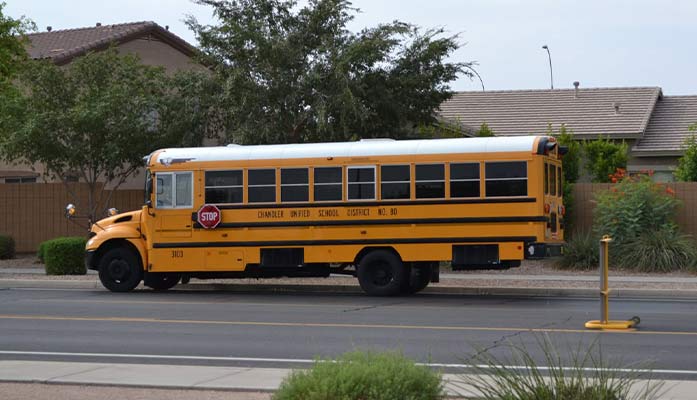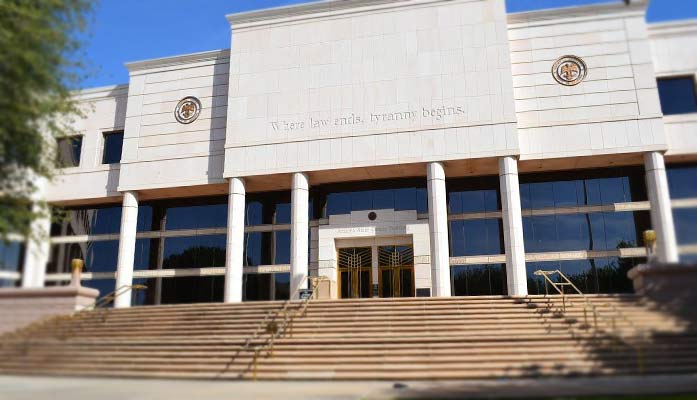
by Corinne Murdock | Aug 20, 2021 | Education, News
By Corinne Murdock |
Both Chandler Unified School District (CUSD) and Tanque Verde Unified School District (TVUSD) declined to join the growing list of schools reinstating a mask mandate. For now, masks will remain optional at both districts.
During special meetings on Thursday devoted solely to COVID-19 mitigation strategies, the governing boards of CUSD and TVUSD both voted against reinstating a mask mandate.
For CUSD, the vote was close: 3 to 2. Board members Lara Bruner and Lindsay Love both voted in favor of restoring a mask mandate. For TVUSD, the board was decisively against reinstating a mask mandate: 4 to 1. Only board member Vieri Tenuta voted yes.
The legislature passed a law in June intending to ban mask mandates in schools for the summer and fall school years. Those schools reinstating their mask mandates have argued that the ban doesn’t apply until September 29. That’s the date that a judge has ruled the state’s mask mandate ban was active, citing Arizona law prohibiting statutes from taking effect until 90 days after a legislative session ends.
Maricopa County Superior Court Judge Randall Warner issued the ruling in the case of a biology teacher challenging Phoenix Union High School District’s (PXU) mask mandate.
The CUSD Governing Board attached a copy of the PXU ruling for consideration. They also included several announcements on education funding from Governor Doug Ducey – one of which concerned the $163 million in grants only available to schools that continue in-person learning for the rest of the year and follow all state laws.
By that latter stipulation, Ducey meant the mask mandate ban he signed into law in June. The governor and other supporters argue that the law took effect months ago based on a retroactivity clause.
Approximately 20 other districts, private schools, charter schools, and Montessori schools have reinstated mask mandates.
The school districts are: Alhambra Elementary School District, Amphitheater School District, Catalina Foothills School District, Creighton School District, Flagstaff Unified School District, Glendale Elementary School District, Kyrene School District, Littleton Elementary School District, Madison School District, Miami Unified School District, Nogales Unified School District, Osborn School District, Peoria Unified School District, Phoenix Elementary School District, Phoenix Union High School District, Roosevelt Elementary School District, Tucson Unified School District, and Washington Elementary School District.
Private schools requiring masks are Brophy College Preparatory and Salpointe Catholic High School, whereas charter schools requiring masks are Arizona School for the Art and Flagstaff Arts and Leadership Academy. The two Montessori schools requiring masks currently are Haven Montessori School and Khalsa Montessori School.
At least one other school district will decide on reinstating a mask mandate Friday – Marana Unified School District (MUSD). The district also cited Judge Warner’s recent ruling as rationale for considering the matter of restoring mask mandates.
Corinne Murdock is a reporter for AZ Free News. Follow her latest on Twitter, or email tips to corinne@azfreenews.com.

by Terri Jo Neff | Aug 20, 2021 | News
By Terri Jo Neff |
Three investigators with the National Transportation Safety Board are in Coolidge hoping to determine what caused a 30-inch El Paso Natural Gas pipeline to explode earlier this week, killing two members of a family and critically injuring a third.
Rosalita Alvarez remains hospitalized in Phoenix after suffering severe burns in a house fire which ignited shortly after 5:30 a.m. last Sunday. Her husband Luiz and their daughter Valeria, 14, died inside the house, according to the Pinal County Sheriff’s Office.
Authorities believe the fire was triggered by the explosion of the Kinder Morgan-owned pipeline. The ruptured portion of the pipeline is located about one football field’s distance from the Alvarez home, which was destroyed in the blaze.
According to Peter Knudson of the NTSB, the agency’s investigators arrived Monday and are expected to remain in the area for a few more days as they search for the probable cause of the explosion and fire. They are also looking for any contributing factors.
The NTSB is joined in the investigation by the Arizona Corporation Commission, the U.S. Department of Transportation’s Pipeline and Hazardous Materials Safety Administration, and Kinder Morgan. The Pinal County Sheriff’s Office and the Coolidge Police Department are also involved due to the fatalities.
Knudson told AZ Free News on Thursday that a preliminary report will be posted to the NTSB website in mid-September. However, a final report about the tragedy could take 12 to 24 months to complete.
In a statement released by Kinder Morgan shortly after the incident, the company said it experienced “a pipeline failure” but that the impacted pipeline segment was isolated. It took emergency responders until nearly 8 a.m. to shut off the flow of gas to the area, the Coolidge Fire Department reported.
Coolidge residents miles away from the pipeline reported hearing and feeling the explosion Sunday morning, and a large fireball was visible for miles, including in Casa Grande.
The NTSB is an independent federal agency responsible for determining the probable cause for pipeline incidents, as well as civil aviation, railroad, highway, and marine accidents.

by Corinne Murdock | Aug 20, 2021 | Education, News
By Corinne Murdock |
Governor Doug Ducey’s program offering up to $7,000 in grants for low-income K-12 parents wanting to relocate their students due to their current school’s COVID-19 protocols began Friday. Eligible families have a total household income at or below 350 percent of the Federal Poverty Level, and show proof that their current school has COVID constraints, including: mask mandates, quarantines, vaccine mandates, or discrimination based on vaccination status. The grant funds may be used for a variety of education-related expenses beyond tuition like transportation, online tutoring, and even child care.
Ducey announced the $7,000 booster on Tuesday. The governor’s office cited Yale University research that found COVID-based school closures disproportionately harm low-income students. More affluent students reportedly didn’t exhibit any significant impairments.
“We are committed to keeping all Arizona kids on track, closing the achievement gap and equipping underserved students and families with the tools they need to thrive,” said Ducey. “Our COVID-19 Educational Recovery Benefit will empower parents to exercise their choice when it comes to their child’s education and COVID-19 mitigation strategies. It will also give families in need the opportunity to access educational resources like tutoring, child care, transportation and other needs. We know that historically disadvantaged communities bear the brunt of excessive and overbearing measures, and we want to ensure these students are protected.”
Parents interested in learning more about these grants can review or apply for the program here. Applicants are accepted on a first-come, first-serve basis.
These grants were just one of three plans increasing education funding that the governor introduced Tuesday.
Another plan that Ducey announced was $163 million in grant funding for district and charter schools that remain open all year. Ducey explained that the goal of this funding incentive is to increase funding to $1,800 per student.
The third plan Ducey issued offers up nearly $65 million to a variety of learning programs across all education levels: K-12 literacy, adult education, and teacher professional development. Like the plan offering up to $7,000 per student for low-income families, $3.5 million of these funds will help launch 50 new micro-schools: an alternative learning model to public and private schools for low-income families.
AZ Free News inquired with State Representative Michelle Udall (R-Mesa), the House Education Committee Chair, about this latest in education funds for parents. Udall didn’t respond by press time.
Corinne Murdock is a reporter for AZ Free News. Follow her latest on Twitter, or email tips to corinne@azfreenews.com.

by Corinne Murdock | Aug 20, 2021 | Education, News
By Corinne Murdock |
On Thursday, the Arizona Supreme Court ruled that Proposition 208 (Prop 208), the voter-approved increase on income taxes to fund public education, was unconstitutional and remanded to lower court. If that trial court determines that Prop 208 exceeds the constitutional spending limit, then Prop 208 would be killed. Chief Justice Brutinel authored the opinion.
The case, Fann, et al. v. State of Arizona, et al., challenged one major provision of Prop 208 and the circumstances of its approval.
First, the case questioned how Prop 208 exempted itself from the Arizona Constitution’s provisions on tax revenue spending caps, or the Education Expenditure Clause.
Brutinel ruled this aspect of Prop 208 unconstitutional. The chief justice made sure to note that this ruling rendered the other aspects of Prop 208 unworkable and unseverable. Meaning, no part of Prop 208 is enforceable if the trial court concurs with the Arizona Supreme Court’s opinion.
“We hold that the direct funding provision does not fall within the constitutional definition of grants in article 9, section 21 of the Arizona Constitution, and Prop. 208 is therefore unconstitutional to the extent it mandates expending tax revenues in violation of the Education Expenditure Clause,” wrote Brutinel. “Likewise, the remaining non-revenue related provisions of Prop. 208 are not separately workable and thus not severable.”
Second, the case challenged tax impositions made by voter initiative. The plaintiffs cited the Arizona Constitution’s Tax Enactment Clause, which stipulates that tax changes must be approved through a two-thirds vote by the state legislature.
The court disagreed with this assessment.
“Additionally, we hold that Prop. 208 does not violate article 9, section 22 of the Arizona Constitution (‘Tax Enactment Clause’), because that clause does not apply to voter initiatives,” wrote Brutinel. “Therefore, the bicameralism, presentment, and supermajority requirements found therein are inapplicable to Prop. 208.”
The Goldwater Institute, Snell & Wilmer, and Greenberg Traurig filed the lawsuit on behalf of the 11 plaintiffs: State Senate President Karen Fann (R-Prescott); State Senators David Gowan (R-Sierra Vista) and Vince Leach (R-Tucson); Arizona House Speaker Russell Bowers (R-Mesa); State Representatives Regina Cobb (R-Kingman), John Kavanaugh (R-Fountain Hills), Steve Pierce (R-Prescott); Montie Lee of Lee Farms; Dr. Francis Surdakowski; NO on 208; and Arizona Free Enterprise Club.
In a statement, Goldwater Institute Vice President for Litigation Timothy Sandefur classified the ruling as a win.
“Today represents a major victory for the hardworking taxpayers of Arizona,” said Sandefur. “The justices made clear that the state constitution’s limits on spending—which were added to the Constitution by the voters themselves—cannot be simply ignored, as Prop. 208’s funders attempted.”
Governor Doug Ducey concurred that this ruling signaled that the end was near for Prop 208.
“There is a clear legal path to Prop 208 being knocked down entirely, it’s only a matter of time,” tweeted Ducey. “The out-of-state proponents of this measure drafted bad language, and now they are paying the price.”
Proposition 208 (Prop 208) tacked on 3.5 percent to the existing 4.5 percent income tax for individuals making over $250,000 or couples making over $500,000. Previously, Arizona’s income tax rate was capped at 4.5 percent for individual incomes above $159,000 or joint incomes above $318,000. The revenue from the income tax increase would fund a wide variety of educator salaries and programs.
About 52 percent of Arizonans voted in favor of Prop 208 last November, and about 48 percent voted against it.
Corinne Murdock is a reporter for AZ Free News. Follow her latest on Twitter, or email tips to corinne@azfreenews.com.

by AZ Free News | Aug 19, 2021 | Education, News
On Thursday, Holocaust survivors, students, lawmakers and educators joined Governor Doug Ducey as he signed legislation strengthening instruction about the Holocaust and other genocides in Arizona’s schools. House Bill 2241, sponsored by Rep. Alma Hernandez, requires young Arizonans to learn the enduring lessons of the Holocaust and the tragic consequences of religious and racial intolerance.
“Arizona has long been a leader on civics education, but it’s clear we need to extend our curriculum to more closely cover the horrors of the Holocaust,” said Governor Ducey. “This bill is a step in the right direction but our work is far from over. Antisemitism and other forms of hate are real, and we must do more to make sure this never, ever happens again. My thanks to Representative Alma Hernandez for leading this effort, along with Speaker Bowers and all of the survivors who have dedicated their lives to spreading awareness.”
Governor Ducey was joined by Senate President Karen Fann, House Speaker Rusty Bowers, legislators, Holocaust survivors, members of Arizona’s Jewish community, Holocaust education advocates and students at the Arizona State Capitol for the ceremonial signing.
“I can’t begin to express how proud I am to see this important legislation get signed,” said Representative Hernandez. “Thank you to the Holocaust survivors, advocates, students and community leaders who supported House Bill 2241. This is a big win for not only Arizona’s Jewish community, but for the future of our state. My thanks also goes to Governor Ducey for his continued support in our efforts to reject antisemitism and expand Holocaust education.”
According to a Pew Research Center study conducted in 2019, fewer than half of respondents could correctly answer multiple-choice questions about the number of Jewish individuals who were murdered during the Holocaust or the way that Adolf Hitler came to power.
“This important bill will strengthen our youth’s understanding of a dark time in history,” said Speaker of the House Rusty Bowers. “I’m grateful to Representative Hernandez for her effort in leading this bill in the legislature. It was an honor to work with my colleagues to get this done, and I’m grateful to Governor Ducey for signing this bill into law.”
Antisemitism has been on the rise in recent years with 18 incidents in Arizona already this year. Last year there were more than 2,000 incidents of antisemitism around the country and 23 incidents in Arizona, according to the Anti-Defamation League.
“These antisemitic acts are disgraceful and unacceptable, and we’re going to do everything we can to ensure Arizonans of the Jewish faith are treated with respect, dignity and humanity,” the Governor said during the signing ceremony.

by AZ Free News | Aug 19, 2021 | News
The city of Glendale has informed the National Hockey League’s (NHL) Arizona Coyotes that the upcoming season will be the team’s last in Gila River Arena. The parties have been operating under a year-to-year agreement for several years. The agreement provides that either party can decide not to renew the agreement for an additional year by providing written notice each year on or before Dec. 31.
“We are thankful to the NHL and the Arizona Coyotes for being part of the Glendale community for the past 18 years,” said Glendale City Manager Kevin Phelps. “The decision to not renew the operating agreement with the Coyotes was not made overnight or in a vacuum. We carefully weighed input from key stakeholders, our expert economist, our arena management firm and our City Council.”
Phelps said the “future of the Sports and Entertainment District has never looked brighter.”
More than a billion dollars of investment has occurred in the District during the past three years. The magnitude of this private investment is unprecedented in Glendale’s history.
“Over the next year, the City will be announcing many new projects that will generate incredible excitement for residents, visitors and stakeholders,” said Phelps. “As amazing as the Sports and Entertainment District is today, the next several years will be even more transformative as this momentum continues.”






